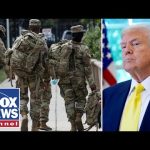In recent days, Chicago has become the stage for a dramatic clash between federal agents and local activists, shedding light on the complex issues surrounding illegal immigration and crime in the city. On a sunny Sunday, federal agents took action against illegal immigrant criminals, rounding them up in a city known as a sanctuary for undocumented individuals. The mayor’s continual effort to portray these law-enforcement officials as the antagonists in this scenario raises eyebrows and touches the nerves of many Chicagoans who are understandably fed up with the rampant crime plaguing their neighborhoods.
This past Sunday saw at least 50 protesters gather at an ICE facility in Broadview, a suburb of Chicago, where the action took a turn for the worse. Eleven individuals were arrested for violent behavior near the detention center, and two guns were confiscated from them. This unsettling turn of events underscored the increasing tension surrounding immigration enforcement and public safety. Just last week, similar unrest saw 16 individuals arrested at the same facility, indicating a troubling pattern of hostility towards federal efforts to maintain order.
Chicago is grappling with not only the challenges posed by illegal immigrants but also the reality of crime that infests the city. Rival gangs, some composed of undocumented immigrants, are casting a long shadow over communities already struggling with lawlessness. The concern among citizens is palpable, as they witness their daily lives disrupted by this escalating violence. Many residents are calling out for increased law enforcement presence, insisting that efforts to address crime must include all criminals, regardless of their immigration status. The request seems reasonable enough, especially in a city where safety is becoming a luxury rather than a right for its residents.
Amidst all the chaos, there is a chorus of frustration directed at the mayor. Critics are puzzled by the leadership’s apparent hesitance to fully cooperate with federal law enforcement agencies like ICE, the FBI, and the ATF. These organizations have been standing by, ready to assist with investigations and improvements in public safety. However, the mayor’s resistance against federal intervention raises questions about priorities and the real motives behind failing to protect citizens from the very real threats posed by organized crime.
Meanwhile, as tensions simmer in Chicago, the political landscape is also shifting in other parts of the country. President Trump has recently signaled intentions to send federal troops to crime-ridden areas, such as Portland, Oregon. This move has ignited its own firestorm of debate, where local leaders are pushing back against what they perceive as unnecessary federal overreach. Yet, many critics, including those from Chicago, argue that only a united front against crime—illegal and otherwise—can save cities from descending into broader chaos.
With the spotlight on potential solutions, both federal and local leaders face mounting pressure to reconcile their approaches to crime and immigration. The message is clear: residents deserve a safe city, and it is high time for their leaders to put politics aside and focus on protecting communities from the dangers lurking right outside their doors.




